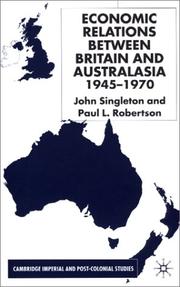
Economic relations between Britain and Australasia, 1945-1970
By Paul L. Robertson, John Singleton
Subjects: Great britain, commercial policy, Foreign economic relations, Commercial policy, Australia, foreign economic relations, New zealand, foreign economic relations, Great britain, foreign economic relations, Great britain, foreign relations, australia, History
Description: "In the early postwar era, Britain enjoyed a very close economic relationship with Australia and New Zealand, through their common membership of the Sterling Area and the Commonwealth Preference Area. This book examines the breakdown of this relationship in the 1950s and 1960s. Australia and New Zealand's determination to protect their manufacturing industries reduced the opportunities for British exporters. At the same time, the slow growth of the British food market, combined with the subsidization of British farmers, reduced the profits of Australian farmers. Australia and New Zealand were drawn towards Japan and the USA for markets and capital supplies. British frustration with Australian economic demands helped to fuel interest in European integration in the mid-1950s. Special emphasis is given to the implications for Australia and New Zealand of Britain's proposal for a European free trade area, and of Harold Macmillan's unsuccessful bid to join the EEC in 1961-3."--BOOK JACKET.
Comments
You must log in to leave comments.